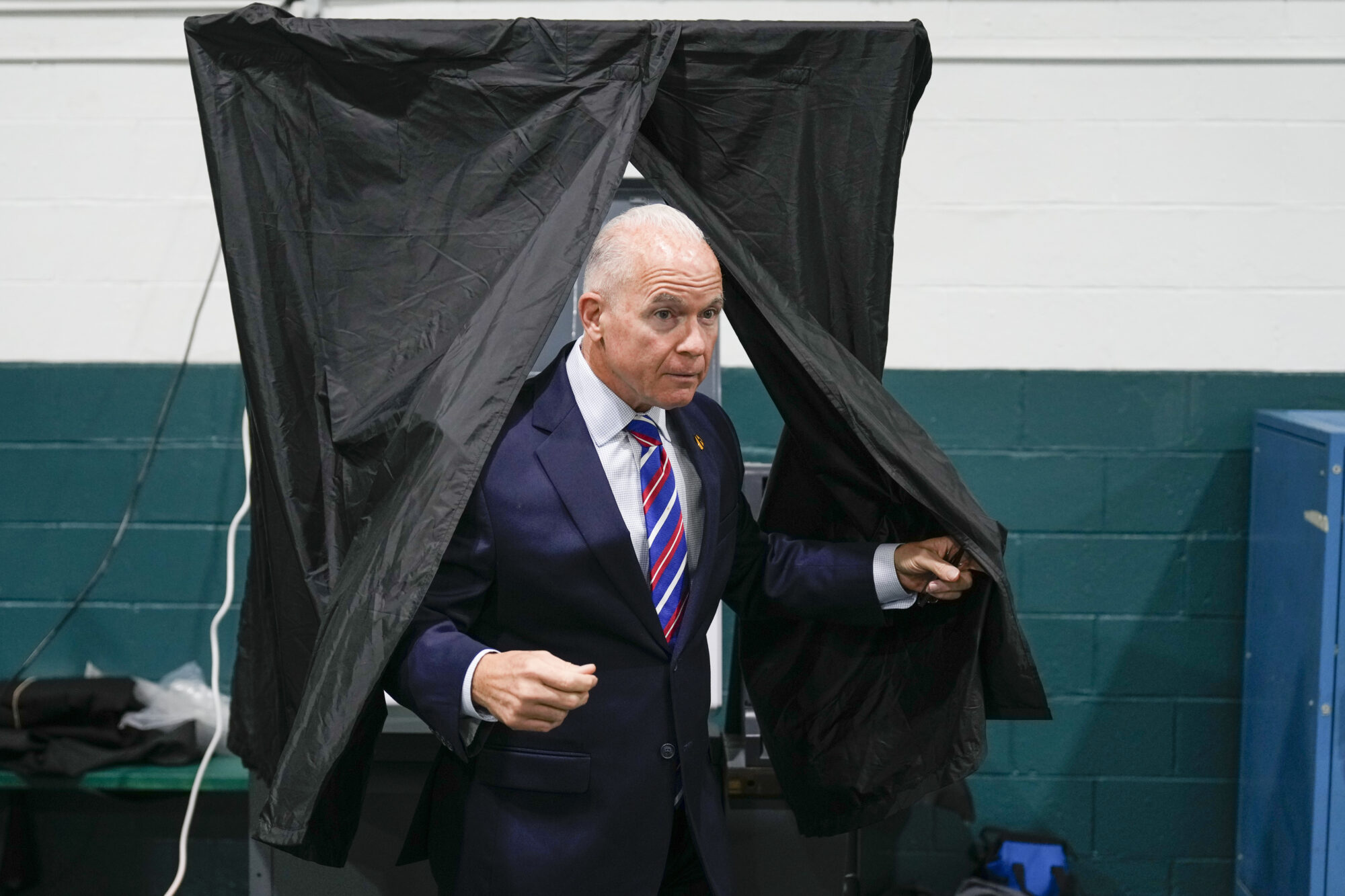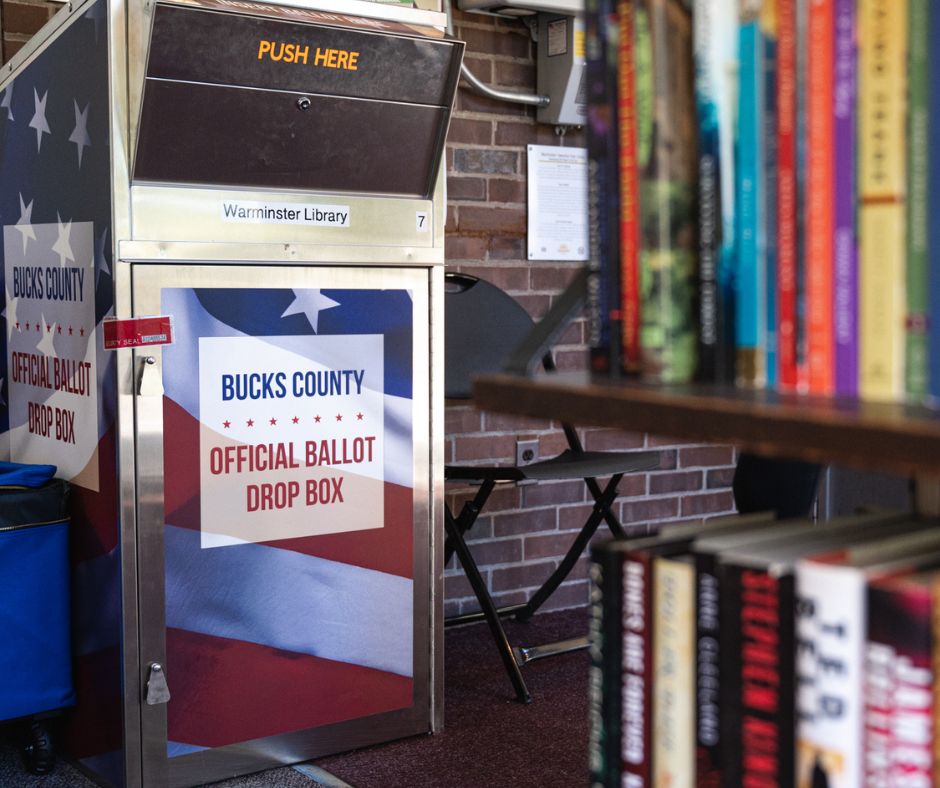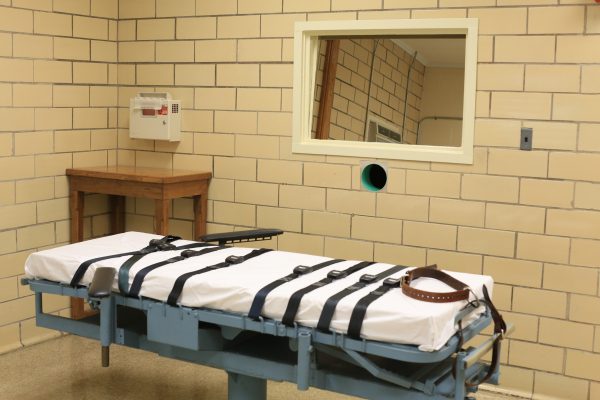Democrats’ Strong Election Night Will Likely Shield Ballot Access in Pennsylvania
Democrats expanded their majority on the state supreme court and won a wave of county offices that determine policies on mail voting and are charged with certifying results.
| November 10, 2023

The next presidential election may still be a year away, but voters in the nation’s biggest swing state just selected the public officials who will be in charge of running it. And much like in other parts of the country, Pennsylvania Democrats enjoyed a blessed night on Tuesday, keeping control of the populous suburbs where they’ve eased access to mail voting in recent years and beating some Republicans who had amplified former President Donald Trump’s false claims of fraud.
For one, Democrats swept the state’s judicial elections, including a decisive win in a hotly contested supreme court election, which gives them a stronger position when election lawsuits inevitably emerge next year.
They also celebrated a wave of wins in county commissions, which double as boards of election nearly everywhere in Pennsylvania and have a startling amount of discretion to shape ballot access in their counties, from deciding whether to install any ballot drop boxes allow voters to fix mistakes on mail ballots. Democrats defended all the local gains they made four years ago in what was already a historically excellent election cycle, and also appear to have flipped two more populous counties away from Republican control.
Some Pennsylvania counties have drop boxes for voters to conveniently deposit absentee ballots and proactively notify voters who make mistakes that risk invalidating their ballot, such as leaving the outer envelope undated or unsigned—a policy called ballot curing. Other counties choose not to have drop boxes or ballot curing processes since state law leaves that matter entirely up to local officials. While these differences do not neatly break along party lines, populous counties run by Democrats have been more likely to set up drop boxes and allow ballot curing.
“You can have boards of elections that are 15 minutes apart and yet the rules are so different,” says Kadida Kenner, executive director of New PA Project.
The resulting patchwork frustrates voting rights advocates who want the state to enforce stronger standards, but for now it compounded the importance of Tuesday’s elections for ballot access in Pennsylvania. “We’re heartened by the fact that, because of these elections, voters will have greater confidence that curing provisions and ballot drop boxes will stay in place in many places where they currently are,” Philip Hensley-Robin, executive director of Common Cause Pennsylvania, told Bolts on Wednesday.
Tuesday’s results would also make it tougher for the Trump campaign to try to invalidate results, if the former president, who is the frontrunner for the GOP’s presidential nomination, attempts to overturn an election as he did three years ago.
They mean that the former president would face an even more uphill climb in state courts. And they leave him with nowhere to turn in this state if he tries to reprise his 2020 strategy of pressuring counties that went for Joe Biden to block certification, since Democrats have now secured control of all such counties across Pennsylvania.
“Pennsylvania voters soundly rejected candidates that ran on platforms that supported the Big Lie, that supported the idea that our elections are unsafe or any idea that we should restrict access to the ballot,” said Nick Pressley, Pennsylvania director for All Voting is Local. “We saw that up and down.” Pressley lives in Centre County, an area that Biden carried by 5 percentage points in 2020 and where Democrats easily defended their majority on Tuesday.
Still, election deniers and Republicans who have amplified Trump’s election conspiracies and resisted past election results did score some victories on Tuesday.
These candidates largely won in red-leaning areas where they were favored to prevail as soon as they won the Republican primaries, as Bolts reported in May. In some counties like Berks, Fayette, and Lancaster, the incumbent commissioners who secured new terms already played with the election system last year by briefly refusing to approve election results.
These jurisdictions may emerge as hotspots for litigation once again next year, a looming prospect that explains why Democrats are relieved to have buttressed their supreme court majority as they did. But they are also a reminder that the Republican base has shown little inclination to punish politicians for toying with election conspiracies.
“It doesn’t seem to me like they’ve even gotten over 2020 yet,” says Duncan Hopkins, a local organizer with the group Lancaster Stands Up, who confronted Lancaster County’s two Republican commissioners at a 2022 public meeting about their ties to election deniers. He said of the commissioners, “If they try to pull what they pulled last year with their blatant attempts to disenfranchise voters, we’re absolutely going to organize folks to stand up to them.”
Heading into Tuesday, Democratic operatives in Pennsylvania were nervous about losing some counties, with several pointing to Bucks, a populous swing county in the Philadelphia suburbs, as a critical battleground.
Trump in 2020 sued the county’s Democratic commission, demanding that they toss thousands of mail ballots, and the chair of the Bucks County Republican Committee, Pat Poprik, signed up as a fake Trump elector in 2020, which fueled Democratic concerns about losing control of election administration in that county this year. Another fake Trump elector, Sam DeMarco, is a commissioner in Allegheny County (home to Pittsburgh), and he would have found himself in the majority on Allegheny’s board of election had the GOP won the county executive race on Tuesday.
Instead, Democrats kept their majority in Allegheny and Bucks counties, as well as in four other counties that they flipped from GOP control in 2019: Chester, Delaware, Lehigh, and Monroe.

Some of these counties, like Chester, had swung Democratic for the first time in decades four years ago, so Democrats were relieved to extend their streak this year. They also held off a Republican surge in Allegheny County, where they only prevailed by 2 percentage points in the executive race after statewide Democratic officials rallied for their nominee.
This secures Democratic control throughout the populous ring of suburban counties that surrounds Philadelphia, as well as in the state’s other urban core in western Pennsylvania. Democrats also expanded their majority in Erie County, a swing jurisdiction in northwest Pennsylvania.
Democrats also appear to have flipped two new counties. They regained a majority on the Northampton county council, which they’d lost in February when a Democratic commissioner joined the GOP. And they’re on track to gain a new majority in Dauphin County, home to Harrisburg, the state’s capital city; they currently have a lead there, pending the final count of provisional ballots next week.
If Democrats hold their lead and win in Dauphin, this would be the party’s first time with a majority on the county commission in at least 100 years, according to The Pennsylvania Capital-Star. It would also mean Democrats have a governing majority in every county that Joe Biden carried in 2020.
Justin Douglas, a Democratic candidate and political newcomer who would join Commissioner George Hartwick as the second Democrat on the three-person commission, told Bolts that he is eager to expand ballot access next year and will propose that the county install more ballot drop boxes to ensure they are accessible to more voters. “We have to be mindful that voting access can always be improved,” he said.
Unlike many of its neighboring counties, Dauphin County did not allow ballot curing in 2020 and 2022, denying voters who made a mistake a chance to correct their ballots before they got tossed. The county’s elections office did not reply to questions about its current policy or whether it reached out to people this fall whose ballots may otherwise be rejected.
Douglas says he wants to ensure that Dauphin County enables ballot curing in 2024 and that it proactively reaches out to voters to inform them of any problem. “The county should be making every effort to call those people and have them come down to the board of elections or a local polling place,” he says. “I just think that we should be doing everything so every vote counts.”
Hensley-Robin, of Common Cause, hopes to persuade local officials throughout the state to embrace similar positions.
“Any newly elected county commissioner should look at providing notice to voters—some counties are not providing notice at all—and provide a means to cure ballot errors,” he told Bolts. “We would go to newly elected county commissioner, Democrat or Republican, and argue that the voters in their counties should have as many opportunities as voters in any other county.”
Against this patchwork of ballot access, with each of Pennsylvania’s 67 counties deciding how easy it is for people to vote, advocates have sought statewide reforms. Common Cause is currently asking state lawmakers to pass legislation that would clarify that all counties must allow voters to correct their ballots.
In the meantime, voting rights advocates think the result in Tuesday’s state supreme court election may open the door for stronger protections for voters throughout the state.
During last year’s midterms, Pennsylvania tossed thousands of mail ballots that had no date on the envelope, or an incorrect date, because the Pennsylvania supreme court deadlocked 3-3 over whether it should order counties to count them; the seventh seat on the court was left vacant when Democratic Chief Justice Max Baer died last year.
On Tuesday, Democrat Daniel McCaffery prevailed 53 to 47 percent in the race to replace Baer against Carolyn Carluccio, the Republican nominee, after a campaign that broke fundraising records.
The result gives Democrats a 5-2 lead on the court. Election cases haven’t always been party line on this court, as with last year’s 3-3 decision on undated mail ballots. Voting rights advocates hope that the court will revisit that decision and others like it to rule in a manner more favorable to ballot access.
McCaffery, the incoming justice, told Bolts before the election that he would take an expansive view of how to treat ballots.
“If we’re going to err, we should always err on the side of including votes, as opposed to disqualifying votes for technicalities, or perceived technicalities,” he told Bolts.
Democrats on Tuesday also flipped the majority on Pennsylvania’s Superior Court, an appellate court that largely deals with criminal cases; their nominees won two seats that were held by GOP judges. Republicans will retain a 5-4 majority on the Commonwealth Court, the other intermediate appellate court that is likely to hear appeals in election cases, but a Democratic candidate on Tuesday also won a GOP-held seat on that court and narrowed Republicans’ edge.
Beyond cases dealing with mail voting, the supreme court result also hands Democrats a buffer for any cases that may emerge after the 2024 presidential election if Trump, who is on track to again be the Republican nominee, attempts to contest another possible loss in the state.
Carluccio, the Republican nominee, echoed some of Trump’s unfounded allegations of fraud during this year’s campaign, saying that mail voting had provoked “hanky panky” in past elections. She also seemed to invite a new legal challenge against Act 77, the bipartisan law that authorized no-excuse mail voting in 2019.
Asked by the Inquirer editorial board in October who won the 2020 presidential election, Carluccio replied that she did not know, before trying to modify her answer upon seeing startled reactions from board members.
Pennsylvania Democrats attacked Carluccio during her campaign for her statements echoing election conspiracies. J.J. Abbott, a Democratic strategist active in this year’s campaigns, told Bolts that the threat of election denialism remains a strong motivator for his party’s base—an important factor in off-year elections where pumping up turnout is critical.
“That’s going to continue to be an issue for Republicans, and I think it’ll be even more acute if Trump is the nominee,” he said.
Questions remain, though, about a string of counties where Republican county commissioners have made moves in recent years that are in lockstep with Trump’s efforts to sow doubt about the election system.
In the spring of 2022, three GOP-run counties refused to certify the results of their primaries; the six Republican commissioners across those counties—Berks, Fayette, and Lancaster—said they disagreed with the state’s rules on mail ballots and wanted to exclude valid ballots from the count. The matter escalated until courts forced the commissioners to reverse course and certify the election results. All six commissioners secured reelection on Tuesday.
Several voting rights lawyers in Pennsylvania told Bolts that they’re confident the state courts would quickly intervene again if these counties, or any other, try to stall certification next year. But they’ve also expressed some anxiety that a rogue commission could at least open the door for the Trump campaign to falsely claim the election is unresolved and try to escalate matters in federal court.
Dante Santoni was elected to the Berks County commission on Tuesday as the sole Democrat, and he will now join Republicans Christian Leinbach and Michael Rivera, the commissioners who voted to block certification last year. (Leinbach and Rivera have also opposed allowing ballot curing in Berks.)
Santoni told Bolts he’d be vigilant about any attempt by his colleagues to stall the election results next year. “That will not be met with quietness for me,” he said. “I will scream from the mountains that we will make sure that Pennsylvania will not be one of those states that drags things out.”
He added, “When the legitimate votes are tallied, we will certify those votes, and if my Republican colleagues refuse to do that, I will raise hell.”
Alex Burness contributed reporting for this article.
Stay up-to-date
Pennsylvania Votes
Bolts is closely covering the ramifications of Pennsylvania‘s 2023 elections for voting rights and criminal justice.




